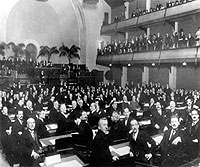This Day in History: January 10, 1946
Additional Date: January 10, 1946
The United Nations Organisation (UNO) succeeded The League of Nations which was founded just after the end of World War I. The League of Nations was put in place to ensure that war is avoided at all costs globally. The organisation would prevent war and disputes between countries by either engaging the countries in disputes in negotiations, imposing verbal sanctions on an aggressor country or by economic sanctions against an aggressor country. It was dissolved in 1945 and replaced by the UNO UNO held its first general assembly in London at the Westminster Central Hall in 1946. Nearly 2000 delegates from 51 countries were present for the historic occasion. The general assembly has been held every year since. It also meets during elections, special sessions and emergency special sessions at the call of the United Nations Security Council or at the concurrence of the majority of UN members with a single member. The General assembly has debated crucial issues over the years, including apartheid in South Africa UNO is simply a more refined version of its predecessor. Its value system is to "maintaining peace on the basis of full international cooperation, and so alleviating the ills that beset mankind." The organisation now boasts 192 members.
